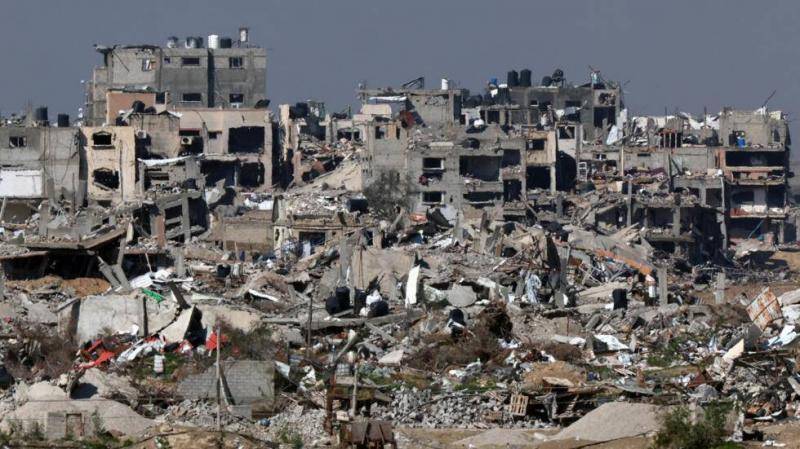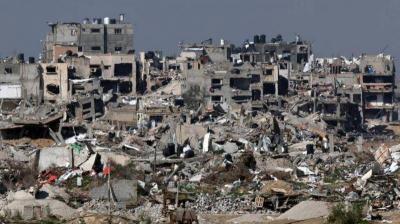Israel and the Islamic Resistance Movement (Hamas) have been waging war in Gaza since the attack by Hamas militants on southern Israel on October 7, resulting in the deaths of 1,200 people and the capture of 253 hostages. Israel retaliated with a military campaign, leading to nearly 30,000 Palestinian deaths, according to health officials in Gaza. In comments published today, U.S. President Joe Biden stated that Israel has agreed to refrain from military activities in Gaza during Ramadan. These comments followed talks between negotiators in Paris and Doha aimed at halting the fighting before an anticipated Israeli assault on Rafah, where more than half of the 2.3 million residents of the Gaza Strip live.
Below is a chronological sequence of the war:
* **October 7, 2023:** Armed Hamas militants infiltrated southern Israel from Gaza, attacking towns in what was described as the bloodiest day in Israel's history. Prime Minister Benjamin Netanyahu declared that Israel was at war and announced the commencement of retaliatory airstrikes on the densely populated Gaza Strip, alongside a complete blockade of the coastal territory.
* **October 13:** Israel requested that residents of Gaza City, home to over one million people, evacuate and move south. Over the following weeks, Israel took steps to evacuate the entire north, displacing hundreds of thousands of Gazans, who often had to flee multiple times as Israeli forces advanced.
* **October 19:** A U.S. Navy warship intercepted missiles and drones launched from Yemen over the Red Sea towards Israel. The Iran-aligned Houthi group in Yemen continued sporadic long-range attacks on Israel and maritime shipping in the Red Sea as part of what it called a campaign in solidarity with Gaza.
* **October 21:** Trucks carrying aid were allowed to cross from the Rafah border crossing from Egypt into Gaza after several days of diplomatic disputes. However, this was only a small fraction of what was needed in Gaza, where food, water, medical supplies, and fuel were running out. Efforts continued to secure enough supplies amid the Israeli blockade and worsening humanitarian crisis.
* **October 27:** After a week of limited incursions, Israel launched a large-scale ground offensive in Gaza, starting with an assault on the north and vowing to free all hostages and eliminate Hamas.
* **November 1:** Evacuations from Gaza began through the Rafah crossing for around 7,000 holders of foreign passports and dual nationals, along with their families and those needing urgent medical treatment. The vast majority of Gaza's population remained unable to leave the territory.
* **November 15:** Israeli forces stormed Al-Shifa Hospital, the largest hospital in Gaza, after a multi-day siege that medical staff said led to the deaths of patients and newborns due to a lack of electricity and supplies. Israelis claimed the hospital was used to hide an underground command center for Hamas militants, a claim denied by the workers. Later, the military took media on a tour inside one of the tunnels there. Within a few weeks, all hospitals serving the northern half of Gaza ceased operations.
* **November 21:** Israel and Hamas announced the first ceasefire in the war: an agreement to stop fighting for four days to exchange women and children among the hostages held in Gaza for women and children detained or imprisoned in Israel for security reasons, and to allow in more aid. The ceasefire was extended to a week, resulting in the release of 105 hostages and about 240 Palestinian prisoners before it collapsed and fighting resumed on December 1.
* **Around December 4:** Days after the ceasefire ended, Israeli forces launched their first significant ground attack in southern Gaza, on the outskirts of Khan Yunis. International organizations stated that the next phase of the war, which would widen the military campaign from the north throughout the entire territory, including areas already hosting hundreds of thousands of displaced people, would severely exacerbate the humanitarian situation.
* **December 12:** Biden stated that Israel's "indiscriminate bombing" of Gaza was losing it international support, marking a clear shift in U.S. rhetoric, Israel's closest ally. In the following weeks, several senior U.S. officials visited Israel to urge it to do more to protect civilians, scale back the war, and shift to a campaign specifically targeting Hamas leaders.
* **December 15:** Israeli forces accidentally killed three hostages in Gaza. The incident led to some public criticism of the course of the war within Israel, although the campaign still enjoyed significant internal support.
* **Around December 26:** Israeli forces launched a major ground attack on areas in central Gaza, after a campaign of airstrikes that again forced hundreds of thousands of people to flee, most of whom were already displaced.
* **Starting January 1, 2024:** Israel indicated that it would begin withdrawing some of its forces from Gaza in a new, more targeted phase of its campaign, which it stated would last several months. Officials said this shift in tactics would start in northern Gaza, while heavy fighting continued in the south.
* **January 11:** U.S. and British warplanes, ships, and submarines carried out dozens of airstrikes across Yemen in response to Houthi attacks on ships in the Red Sea.
* **Late January:** Israeli forces escalated their operations to encircle Khan Yunis, again displacing large numbers of Palestinians, most of whom had previously fled from elsewhere. Following this campaign, more than half of Gaza's population found refuge in Rafah.
* **January 23:** Israel announced the deaths of 24 of its soldiers in Gaza, marking its largest losses in the war.
* **January 26:** The International Court of Justice in The Hague, also known as the World Court, considered a case brought by South Africa accusing Israel of committing genocide in Gaza. The court ordered Israel to prevent acts of genocide but did not go so far as to issue an order to halt combat. The court noted that some actions alleged by South Africa could constitute a violation of the Genocide Convention activated after the Nazi Holocaust against the Jews, and rejected Israel's request to dismiss the case.
* **February 7:** After weeks of U.S.-led diplomatic efforts and mediation by Qatar and Egypt, Netanyahu rejected a counteroffer from Hamas for a ceasefire lasting four and a half months, describing the terms as "illusory." Hamas stated it would not agree to a ceasefire and the release of hostages unless the proposal ended with an Israeli withdrawal from Gaza. Israel maintained it would not withdraw until Hamas was eliminated. Alongside the collapse of ceasefire talks, Israeli officials announced their intention to continue the military campaign and threatened to attack Rafah. U.S. officials and the UN warned that such an attack would lead to significant civilian casualties.
* **February 20:** Ismail Haniyeh, head of Hamas's political bureau, visited Egypt for talks, indicating a renewal of diplomatic efforts to reach an agreement on a ceasefire and avoid the Israeli assault on Rafah.
* **February 27:** After discussions in Paris and the region between negotiators from the U.S., Israel, Qatar, and Egypt, Biden announced that Israel had agreed to refrain from military activities during Ramadan in Gaza, while a senior source close to the talks reported that Hamas had received a draft proposal including a ceasefire lasting 40 days.




